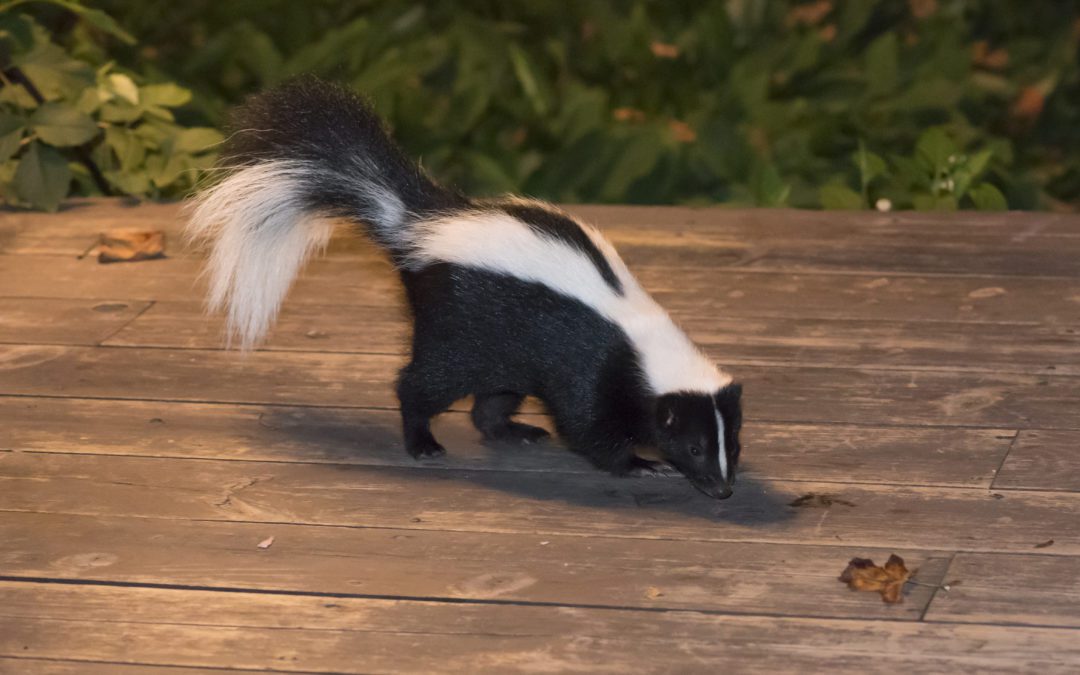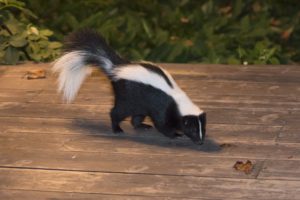Many people don’t know that skunks are still a problem in the winter until it’s too late. Like most mammals, skunks have methods for surviving through the snowy, icy months. They live in larger groups so that they can take advantage of the increase in body heat to keep warm, and they aren’t nearly as active in leaving the den to hunt for food, which helps preserve their energy. Despite not encountering them as often during the winter, skunks are still living in the same areas as when it’s warm, and they can still cause trouble for homeowners. Skunk spray isn’t reserved for the spring and summer. Here are some suggestions for avoiding the need for skunk removal.
How can I keep skunks away from my home?
- Barricade burrowing areas – Skunks are burrowing creatures and like to dig beneath structures to build their nests. Decks, patios, porches, and sheds are all common den sites, but if you make access to these places more difficult, you can protect your home from breach. Simply encircling these areas with chickenwire is ineffective since skunks and other burrowing animals will have no difficulty digging right under and sometimes through the wire. Professional wildlife control companies have barricading mesh that is designed specifically to withstand animal breach, and they employ technicians who know exactly how to install it to keep wildlife out.
- Remove debris from yard – Skunks sometimes seek shelter underneath debris. Getting rid of junk or wood piles in your yard can help keep your property from becoming a permanent home.
- Remove food sources – Leaving food out can lead to more than just the need for ant control. Like all creatures, skunks want to live where there is plenty for them to eat. Skunks are omnivorous and will consume just about anything, so removing as many food options as possible is a must.
- If you have fruit or nut trees on your property, don’t leave any fruit or nuts on the ground when they fall.
- Birdfeeders often end up feeding more than just birds. Birds will often peck through the mix looking for the seeds they like best, which leaves the other seeds all over the ground. Getting rid of birdfeeders altogether is the best solution to avoid a skunk problem, but if that’s not possible, make sure to clean up any seeds that have fallen out of the feeder.
- If you have a cat or dog that goes outside a lot, don’t leave their food outdoors. Both skunks and raccoons love kibble and will think they’ve hit the jackpot.
- Make sure there is no food-based garbage around your house. If you’ve had a picnic outside, don’t wait until later to clean it up. Make sure your trash can lids are secured with bungee cords so animals can’t get them off.
What should I do if I already have a skunk problem?
Skunks pose a number of difficulties for homeowners including structural damage and transmission of disease. While they aren’t likely to attack, they are still the top carrier of rabies in Illinois and capable of infecting others if they are provoked enough to bite. They may also be host to parasites like fleas and mites which can spread to you and to your household pets. However, the most common complaint for homeowners is having to endure the noxious smell of their spray. It permeates everything around it and can be unbearable to deal with day after day. If there is an active skunk burrow on your property, help is just a phone call away. ABC Humane Wildlife handles skunk removal on a daily basis and has a team of wildlife professionals who are eager to help you rid your home of wildlife. Each of our technicians has expert training in capturing skunks, repairing damage caused by skunks, and installing animal-proofing to prevent a future skunk problem.



